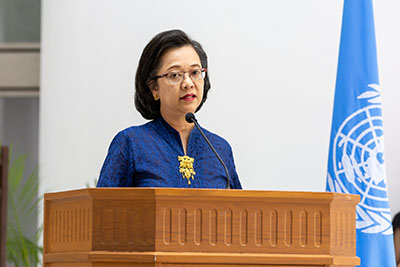Written by
Armida Salsiah Alisjahbana, Executive Secretary of ESCAP and Vice-Chair of UNGIS
As the “Decade of Action” for achieving the 17 SDGs began, it was clear that Asia and the Pacific would not be achieving any of the goals by 2030 [1].
The largest regression in implementation progress has been in Goal 12: ensuring sustainable consumption and production patterns.
Four months later, as COVID-19 lockdowns turned our physical lives into a virtual reality almost overnight, digital connectivity has taken on a compelling new meaning in the region.
For one, in countries such as the Republic of Korea that have shown signs of better combating cluster outbreak, digital innovation has played a central role.
Digital platforms have also helped maintain livelihoods, enabling the effective virtual delivery of high value-added professional services, while e-commerce has boomed.

Moving forward in the “Decade of Action”, this digital reality is a once in a lifetime opportunity to rethink our material-intensive consumption and production patterns and help us transition to a more decarbonized and sustainable economic model.
However, this will be possible only with universal access to affordable and reliable broadband internet all the time. A worrying concern is that Asia and the Pacific remains the most digitally divided region in the world and the divide continues to widen.
More than half of the region’s 4.1 billion people still does not have access to the internet. Even for those that do have access, quality (speed and delays) and affordability often keep the internet out of reach.
A digital future driven by ICT
ESCAP through its Asia-Pacific Information Superhighway (AP-IS), has for a number of years advocated for accelerated investments in ICT infrastructure. Covid-19 and the pressures it has put on congested networks has fast forwarded this need.
The AP-IS initiative aims to increase the availability of broadband infrastructure connectivity by addressing broadband gaps between countries for accelerating implementation of SDGs.
Towards this end, ESCAP is supporting least connected member States in the Pacific and South East Asia respectively, to strengthen subregional internet traffic management for improved internet quality.
In addition, ESCAP is supporting landlocked countries in North and Central Asia that lack direct access to submarine fiber optic cables with policy guidelines for cost-effective co-deployment of fibre optic cable along passive infrastructures such as highway, road, railway, power networks.
Around 80-90% of costs are related to digging/excavation work and obtaining rights of way, so co-deployment or “dig one, use many times” can cost-effectively bringing connectivity to the unconnected.
The International Telecommunication Union (ITU) is a key partner and the AP-IS initiative is recognized in the ITU’s Development Sector (ITU-D) four-year rolling plan 2020-2023 as a strategic regional cooperation initiative to support [2].
ESCAP resolution 73/6 also recognized the call by the UN General Assembly on relevant organizations of the United Nations system to ensure that no one is left behind in its implementation of the World Summit on the Information Society processes [3].
In conclusion, COVID-19 has helped us understand the value of staying connected for SDG achievement. Working as one UN family we have to set ambitious and measurable goals for ensuring meaningful universal connectivity as the Broadband Commission thoughtfully underlined in its 2019 report on the State of Broadband.
______
[1] ESCAP (2019), SDG Progress Report 2019, available at: https://www.unescap.org/sites/default/files/Executive_Summary_Asia-Pacific_SDG_Progress_Report2019.pdf
[2] https://www.itu.int/en/ITU-D/TIES_Protected/OP2020-2023.pdf
[3] https://www.unescap.org/commission/73/document/E73_RES6E.pdf



